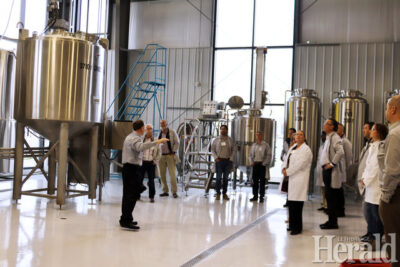Pea processing pilot facility promotes agri-processing sector
By Lethbridge Herald on May 30, 2022.
 Herald photo by Alejandra Pulido-Guzman
PIP international pilot facility plant opened Monday and those in attendance had the opportunity to tour the facility and taste their product.
Herald photo by Alejandra Pulido-Guzman
PIP international pilot facility plant opened Monday and those in attendance had the opportunity to tour the facility and taste their product.Alejandra Pulido-Guzman – LETHBRIDGE HERALD – apulido@lethbridgeherald.com
PIP International has opened a pea-processing pilot facility in Lethbridge after converting a mid-sized craft brewery into a fully commercialized pea processing and testing centre.
Transportation Minister Rajan Sawhney who attended the Monday event representing the provincial government and as a friend of PIP International founder and CEO Christine Lewington, said Alberta’s government is working to create a business environment that attracts new investments from around the world.
She said the provincial government recognizes the significant role and potential of agri-processing in Alberta and the important role that plant-based products play as a driver of diversification.
Lewington said she decided to slow down the construction that started last summer on their large facility, to focus on a smaller facility to prove to their international investors how good their product is at a smaller scale first.
“Our large multinational companies want hundreds of metric tons, to prove and build a product portfolio around our new protein ‘cause it’s so great. They’re not just going to take it and replace it in their current products so it would be not very efficient to have a 200,000 plus square foot facility pounding out thousands, when I only need hundreds. That’s not a good business plan,” said Lewington.
She said that by doing this they will save $20 million just on commissioning a large facility and having a place to start off with.
As part of a two-phase project, the pilot facility is the first step in testing PIP’s new innovative extraction technology that will significantly improve the quality, purity and environmental impact of the protein isolates before scaling up production.
Phase 2 will establish a new $150-million yellow pea protein facility.
Once operational, the facility will create 100 new jobs, process about 126,000 tonnes of yellow peas annually and support more than $75 million in annual pea contracts for local and regional growers.
“The pilot plant will be 17 to 25 full time jobs, the large facility will be up to 100 full time jobs most of them are going to be very high paying jobs ‘cause it’s going to be fully automated,” said Lewington.
Mayor Blaine Hyggen said it is very exciting to see that this facility will provide so many jobs in our region.
“We have two post-secondaries that have some incredible talent, so if we can retain some of those jobs within our community that’s fantastic, so it is really exciting to see the jobs that will be provided at this plant as well as in the expansion are those high paying jobs that will help our economy,” said Hyggen.
Lewington said their facility will only be receiving yellow peas, with a large amount coming from Saskatchewan and another amount coming from Alberta. She said those yellow peas will then turn into pea protein, in two grades of premium and regular, starch and fiber and molasses.
“PIP itself is business to business, so we are an ingredient supplier, so we will most likely be over 90 per cent export until we get larger manufacturers in Canada that want it on this side of the world,” said Lewington.
NDP critic for Agriculture, Forestry, and Rural Economic Development Heather Sweet issued a statement in response to the announcement of the pea-processing pilot facility.
“Just over a year ago, the UCP pulled all provincial funding from the Plant Protein Alliance of Alberta, an Alberta organization whose focus was to help develop plant-protein processing in Alberta. The Alliance championed Alberta’s plant-based products and if the UCP had not cut their funding, I am sure this province would be much further ahead in our development of value-added agriculture. Furthermore, the UCP are leaving farmers and workers in the agri-food sector behind as costs for utilities, fertilizer, feed, fuel, and insurance all increase. The UCP failed to support farmers through a difficult and dry season last year and have not provided a clear plan on how they have learned from this failure,” reads the statement.
Follow @APulidoHerald on Twitter
19-18


